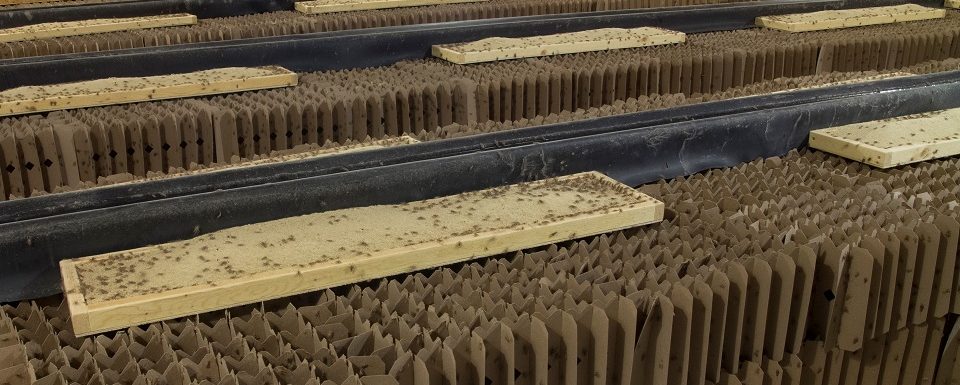Entomo Farms – Sustainable, Alternative Protein from Crickets

Projects Sponsor
Most green enterprises face the already daunting task of claiming their share of an emerging market, but over at Entomo Farms they’re working to build their market from near-scratch. Simply put, you have to ask a lot of North Americans “What do you feel like having for dinner?” before even one of them will cheerfully reply, “Crickets!”
Certainly we are light-years away from becoming an “Oh, man, not crickets again” society but the team of brothers at Entomo Farms, Jarrod Goldin supported by his two co-founders, Darren Goldin and Ryan Goldin very much hope to get us there.
In 2013, the UN Food and Agriculture Organization encouraged the use of insects as food and agricultural feed as a way to ensure protein availability for 9 billion people by 2020. After all, insect protein is nutritionally similar to meat, but requires far less land, water, and other resources to produce. Early research suggests that insects are a highly nutritious food (eaten by over 2 billion people worldwide) providing not only protein, but also highly bio-available vitamins and minerals as well as prebiotic fibre needed for a healthy gut biome.
Documented as these benefits are, Jarrod and the team at Entomo Farms recognized that for the cricket farming industry to get off the ground, there needed to be a reliable supplier of safe, nutritious insect protein ingredients that food companies could incorporate into food products. They also recognized if their product was ever going to be commercially viable close to home, insect protein would have to go into products already found in North American cupboards and refrigerators; sometimes familiarity breeds consumption.
In order to encourage wider adoption of their product, the team has innovated new ways of farming insects in order to lower costs. Entomo Farms launched an entirely new method of production, moving away from raising crickets in bins as was traditionally done. Instead, Entomo Farms built out large rooms where the crickets roam “free range” with feed always available in trays, and water flowing through newly designed troughs.
The new approach lowered labour costs and enabled the production of over 2000 pounds of cricket per room, achieving cost effective scale. Along the way, Entomo Farms learned that cricket “frass” (cricket manure and sheddings) is a dry, odourless, organic fertilizer, enabling the possibility of a circular approach where frass can feed the plants that then feed the crickets. The entire process has been developed to create almost no waste from beginning to end.
Today there are dozens of companies riding this wave of growing interest, relying on insect ingredients from Entomo Farms and others to include in their own consumer offerings, bringing insect foods to consumers in many parts of the world.
Since January 2015, Entomo Farms has shipped hundreds of thousands of pounds of insect powder as an alternative protein to other forms of meat. Compared to consumption of the same amount of beef, each pound of insect powder results in a 67% smaller carbon footprint and 92% less water consumption.
Entomo Farms has grown from supplying fewer than 5 food customers in North America to supplying over 50 food companies and have expanded to Europe, Australia, and Asia. Several aid organizations have expressed interest in learning more about how to incorporate insect protein into food products because it is so nutrient dense and in Toronto you can now find a range of cricket products at Loblaws at Maple Leaf Gardens.
At this rate we can look forward to the day when the question “Hey, who here wants crickets for dinner?” is met not with “Crickets?”, but with “Crickets!” and spoons banged on the edge of a bowl.













